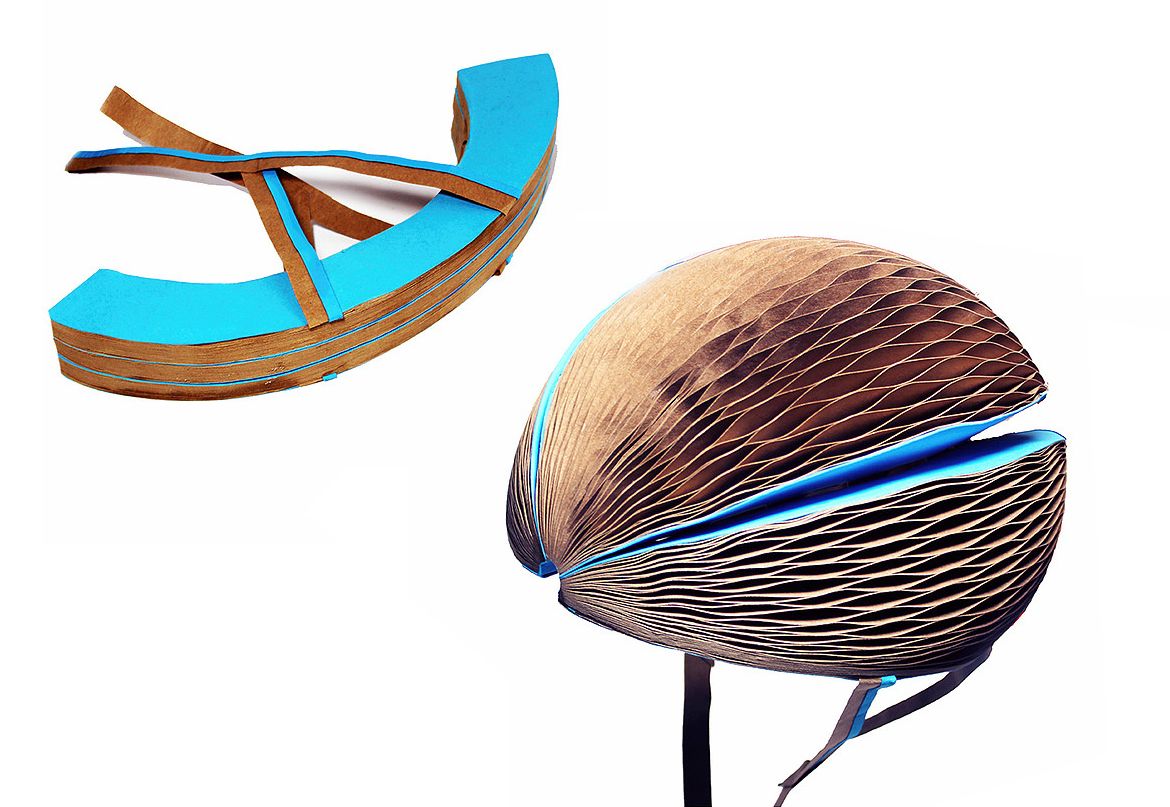
Foldable Bike Helmet Offers Recyclable Protection

Urban bike-sharing programs are booming in many cities, but most casual riders don't usually tote around a helmet. This means when they rent a bike, they often ride helmet-free, which can be a risky move in places were roads aren't designed to safely accommodate both cars and cyclists.
However, a novel design could make an affordable, collapsible, biodegradable helmet available from a curbside vending machine.
The EcoHelmet, designed by Isis Shiffer, is made entirely of cardboard, folds up accordion-style to about the size of a banana and is compact enough to fit in a laptop bag. It unfolds to fit just like a traditional helmet, cushioning the wearer's head with honeycomb-patterned paper that absorbs and distributes impacts, protecting cyclists from injury. [Top 10 Inventions that Changed the World]
On Sept. 29, the James Dyson Foundation selected the EcoHelmet — along with 19 other designs — for the Dyson Engineers Shortlist. These were chosen from among more than 1,000 submissions for the James Dyson Award 2016. The contest's International Winner will be selected from this list by inventor and designer Sir James Dyson on Oct. 27.
Grab and go
Shiffer, a designer and self-described ardent cyclist, told Live Science that during a year traveling abroad, she rented bicycles in many different cities and didn't always have a helmet with her. Riding without one could be a scary experience, she said. So Shiffer decided to create an affordable helmet that riders could pick up on the go, perhaps at the same station where they rent their bikes.
But traditional helmets are so bulky that a vending machine couldn't hold enough to keep up with daily demand, Shiffer explained. Her solution was to design a helmet that could be collapsed to take up a minimal amount of space but that would still provide the same protection as its bulkier cousin.

"For a helmet to work in a bike-share arena, it has to be able to fold up and be reused," Shiffer said.
Sign up for the Live Science daily newsletter now
Get the world’s most fascinating discoveries delivered straight to your inbox.
For the helmet material, Shiffer turned to paper honeycomb, which is lightweight and recyclable, and absorbs impacts so well that it's used in supply packaging for helicopter drops in crisis zones. The next step involved turning the material into something that people would actually want to wear on their heads.
Shiffer admitted that she was partial to an early design that resembled a pineapple. But user reactions convinced her that a less whimsical helmet would likely appeal to a wider audience.
"It doesn't matter how functional it is," Shiffer said. "If you look like an idiot when you put it on your head, no one's going to wear it."
The EcoHelmet, which will be "one size fits most," is designed to be used several times and then recycled. Shiffer is currently preparing her design for U.S. Consumer Product Safety Commission certification, with a goal of making the helmets available in vending machines at bike-share stations, where they could be sold for as little as $5, according to a statement on the James Dyson Award's EcoHelmet project website.
UPDATE: On Nov. 17, the James Dyson Foundation declared Isis Shiffer the 2016 International Winner of the James Dyson Award for her EcoHelmet design. The contest awarded Shiffer $45,000, and provided an additional $7,500 to the university department where she studied design and engineering.
Original article on Live Science.

Mindy Weisberger is an editor at Scholastic and a former Live Science channel editor and senior writer. She has reported on general science, covering climate change, paleontology, biology and space. Mindy studied film at Columbia University; prior to Live Science she produced, wrote and directed media for the American Museum of Natural History in New York City. Her videos about dinosaurs, astrophysics, biodiversity and evolution appear in museums and science centers worldwide, earning awards such as the CINE Golden Eagle and the Communicator Award of Excellence. Her writing has also appeared in Scientific American, The Washington Post and How It Works Magazine. Her book "Rise of the Zombie Bugs: The Surprising Science of Parasitic Mind Control" will be published in spring 2025 by Johns Hopkins University Press.


